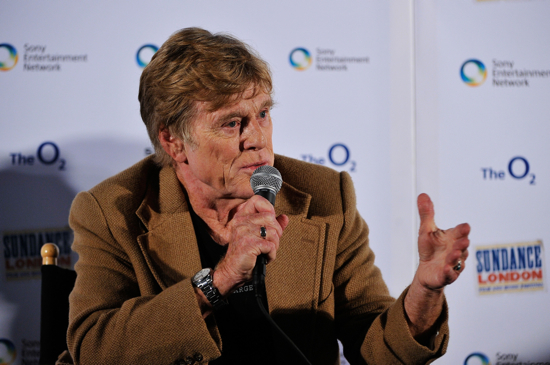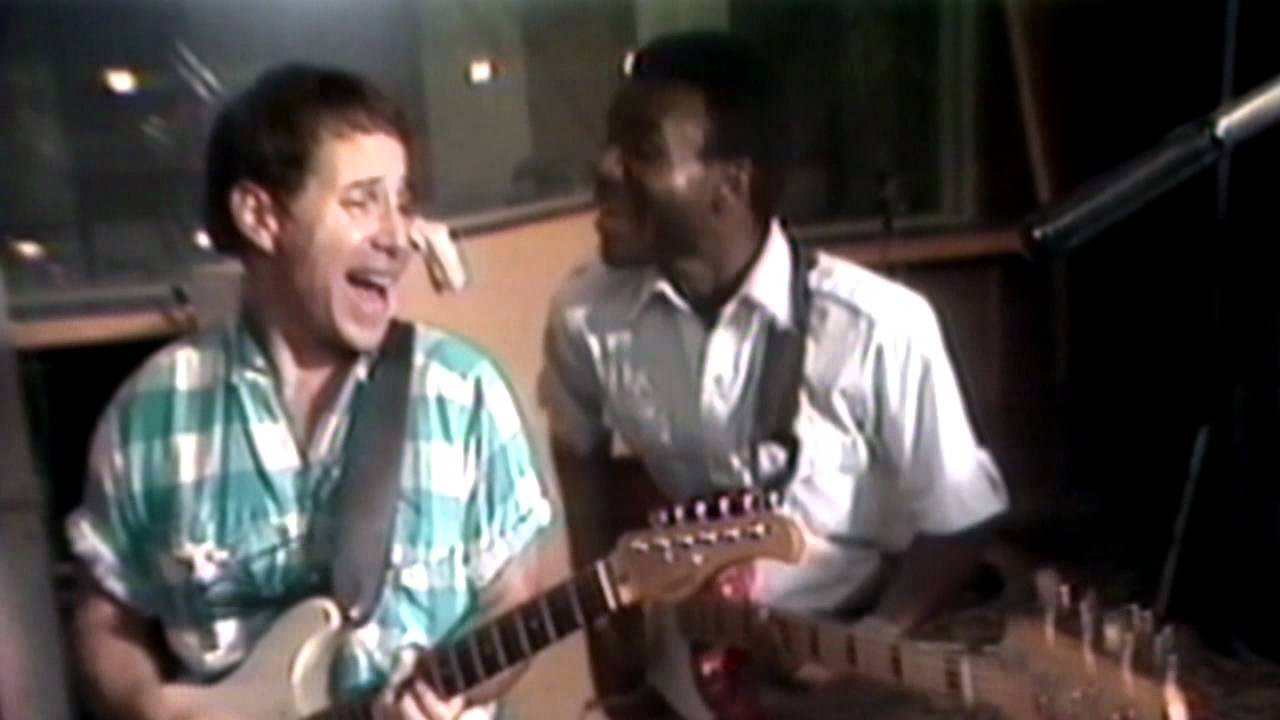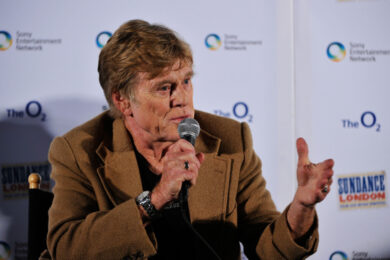A deflated Death Star of corporate consumerism pancaked across post-industrial wasteland on a neglected stretch of the River Thames, the O2 Arena feels like an ominously ill-judged location for an indie-centric, left-leaning film festival. Ringed by high-tech sentry towers on metal stilts, its Gaudi-cathedral spikes twitching like alien antennae in the East London breeze, this lightly militarised citadel of retail escapism feels like a Truman Show soundstage where JG Ballard meets Jean Baudrillard. If you want a picture of our dystopian future, imagine an army of assistant Starbucks managers stamping on a human face – forever.
Hell yeah. Even before I reach the O2, the first ever Sundance London festival has somehow pitched me into an Orwellian strop. Maybe it is the unusually rigid press ticket booking system, making schedule clashes inevitable at this boutique British spin-off from Robert Redford’s celebrated US showcase. Or perhaps it is the festival’s ubiquitous and heavy-handed corporate branding, which extends to announcers robotically demanding applause for their main sponsor before every screening, a mildly farcical ritual that begins to feel increasingly North Korean across the four-day weekend.
But once Sundance London gets underway, my resistance starts to crumble. Still impressively sharp at 75, Redford’s inspirational opening talk is tougher and funnier than any of his anodyne promotional interviews beforehand, especially when he slams David Cameron’s "narrow view" of cinema as a purely commercial art form. The Sundance audience, much like the army of 200-plus volunteers in matching yellow jumpers, is also infectiously keen and more culturally mixed than most Eurofilm festival crowds. Having never visited the O2 in daylight before, I am forced to concede it feels no more Orwellian than most modern shopping malls – a little sterile, but perfectly clean and functional. The multiplex cinema hosting the festival is undeniably comfortable, with crisp digital sound and picture. Maybe this massive concert arena makes sense as a location after all, since Sundance London’s music-heavy programme offers a rare case of a film festival behaving more like a touring rock band, rolling out its greatest hits around the world.
Redford’s long-running US festival, held in snowy Utah every January, is rightly celebrated as a showcase for new talent and liberal politics. It has helped launch dozens of fresh voices from the margins of American cinema including the Coen brothers, Jim Jarmusch, Steven Soderbergh, Spike Lee, Quentin Tarantino, Robert Rodriguez, Todd Solondz and Lisa Cholodenko. Dissenters claim the mother of all indie film festivals has become too lazy and mainstream, losing its edge to younger challengers like Robert De Niro’s Tribeca in New York and South by Southwest in Austin. But Sundance London appears to be aiming to steal back some of its former youth culture buzz, pointedly billing itself as a ‘film and music’ event and incorporating a series of live rock shows into its programme.
One of the big draws is Shut Up And Play The Hits, a film record of LCD Soundsystem’s marathon farewell show at Madison Square Garden last April. Directed by the British duo Dylan Southern and Will Lovelace, this is a fast-moving and impeccably scruffy-stylish affair. It is also a masterclass in evasion, showing everything yet revealing nothing. We see James Murphy shaving in his Brooklyn apartment, walking his dog, shedding a few tears and chatting with an amusingly pretentious indie-hipster interviewer. But we learn almost nothing of his hinterland, his private life, his real motivations. All the same, the bearlike singer comes over as smart, witty and likeable. Arcade Fire also have a memorable cameo, while Murphy’s hilarious English manager seems to be channelling Monty Python’s Eric Idle. He deserves his own documentary.
Another Sundance stand-out is Under African Skies by director Joe Berlinger, best known for his preposterous Metallica documentary Some Kind Of Monster. Following Paul Simon back to South Africa to revisit the controversy surrounding his boycott-busting 1986 album Graceland, Berlinger’s film almost serves as a kind of musical Truth and Reconciliation Commission. Debating with former anti-apartheid activists, Simon never quite concedes he was wrong to break the cultural boycott, but the huge love and respect he receives from black South Africans is both moving and inspiring. In the event, history largely absolved him anyway – Graceland ultimately proved to be a valuable cultural weapon against apartheid, albeit accidentally. Ladysmith Black Mambazo, Paul McCartney, Quincy Jones, David Byrne, Vampire Weekend and more all feature in this joyous, uplifting film.
A theatrical airing for Placebo’s routine tour-doc Coming Up For Air seems an odd Sundance choice, since it was released on DVD last year, but the band still turn up to deliver a ripsnorting live set at the O2’s bijou concert venue, the IndigO2. Their sold-out show is surprisingly powerful, and comes with the added comic bonus of Brian Molko lecturing the rowdy crowd for spitting, shoving and "fucking with my concentration". You can’t beat a pompous goth-rock diva. It’s the gift that keeps on giving.
Rufus and Martha Wainwright also play a short, cabaret-style show at Sundance to launch the world premiere of Sing Me The Songs That Say I Love You, an elegant document of a New York tribute concert hosted by the musical siblings for their late mother, the Canadian folk singer Kate McGarrigle. As in her Leonard Cohen documentary I’m Your Man, director Lian Lunson shoots the performances in long takes and extreme close-up. Very different to the flashy jump cuts of the LCD Soundsystem documentary, but far more intimate and engaging.
The weirdest musical guest of the festival by several miles is Tricky, ostensibly performing his magisterial 1995 debut Maxinquaye with Martina Topley-Bird. Fronting a punchy rock trio interwoven with light-touch electronics, the Bristol livewire begins by stripping down to his torso and hunching into a boxer’s stance at the mic stand. He soon makes clear his disdain for his most critically acclaimed album, digressing widely from heavy-breathing classics like ‘Overcome’ and ‘Hell Is Round the Corner’ into overlong bluesy jams, verbal sparring sessions with Martina, baffling absences from the stage, and even a Dizzee-style rap interlude fronted by his younger brother Marlon. There are moments of opium-dream beauty and loose-cannon brilliance in this unpredictable show, but the finale drags badly as Tricky pulls 30 or 40 people up onstage, then spends half an hour crowd surfing to interminable slo-mo blues-rock. There is nothing wrong with recreating Jim Morrison’s shamanic showman shtick, but it only works with a suitably melodramatic musical backdrop. Ah fuck it, I still love that album, despite these bizarre attempts at self-sabotage by its creator.
Two of the best non-music documentaries at Sundance London take an unflinching look at the American Dream, but from opposite ends of the social spectrum. Finding North, directed by Kristi Jacobson and Lori Silverbush, is a shocking and moving exploration of spiralling food poverty across the US, where around 50 million citizens are now unable to properly feed themselves. By contrast, Lauren Greenfield’s jaw-dropping The Queen Of Versailles offers a fly-on-the-caviar portrait of Jackie and David Seigel, a super-rich couple whose plans to build themselves America’s largest house start to unravel when the financial crash pushes them to the brink of bankruptcy. Like The Osbournes on a NASA-sized budget, Greenfield’s film is a surprisingly sympathetic, cautionary tale about dysfunctional billionaire bling.
On the drama side, one of the most enjoyable Euro premieres is Julie Delpy’s autobiographical rom-com 2 Days In New York, a sequel to her 2007 writer-director debut 2 Days In Paris. Delpy reprises her role as a neurotic expat Parisian, while comedian Chris Rock plays her boyfriend. Some of the culture-clash jokes are pretty broad, but the Woody Allen-ish script sparkles and Delpy’s real-life father Albert again plays an engagingly puckish support role. A surprise cameo by a notoriously egotistical indie-movie badass also provides an agreeably wacko final act twist.
The only real disappointment of the festival is Liberal Arts, an ingratiatingly cute rom-com written and directed by Josh Radnor of How I Met Your Mother fame. Radnor also plays the male lead, a bookish thirtysomething who returns to his old college campus and falls for Elizabeth Olsen’s kooky undergad Zibby – yes, Zibby –a stereotypical indie-boy fantasy of a sweet, virginal, adoring girlfriend with a thing for geeky older guys. Right down to its lightly bearded folk-pop soundtrack and Zac Efron’s novelty cameo as a dorky stoner, this feels way too pleased with itself.
Coincidentally, another Sundance London highlight tackles similar themes of age-gap romance and misplaced nostalgia for lost youth, but with far more dark wit and comic invention. Colin Trevorrow’s Safety Not Guaranteed stars Aubrey Plaza as a sulky intern at a Seattle magazine who goes undercover to investigate a paranoid eccentric, played by Mark Duplass of micro-budget mumblecore movement fame, after he places a cryptic classified ad claiming to have invented a time travel machine. Inspired by a bizarre real-life advert, Trevorrow’s lo-fi sci-fi comedy thriller is a winningly wonky hybrid of Repo Man and Back To The Future.
After four days, 27 films and 17 musical performances, the Sundance London caravan folds up its tents, leaving the O2 Arena to return to business as usual. Redford and his team have not yet confirmed plans to repeat their transatlantic experiment next year, but this greatest hits package was a pretty decent primer. Three decades on, however compromised by commerce, the Sundance brand still seems to stand for something.




